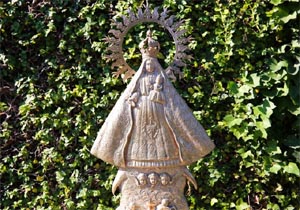Article: Roman Catholic Church And The Last Days
Marking the feast of the patroness of Cuba, Our Lady of Charity of El Cobre, Pope Francis on Monday sent a letter to Archbishop Dionisio Garcia Ibanez of Santiago encouraging the faithful of the island country to remain steadfast in their devotion to the Virgin Mary.
The Sept. 8 letter marks the Feast of Our Lady of Charity of El Cobre, which is shared with the Nativity of Mary. Her statue is kept at the Basilica del Cobre, near to Santiago. A statue of Our Lady of Charity was enthoned at the Vatican Gardens last month; it had been brought to the Holy See in 2008, at which time Benedict XVI had blessed it.
The original statue was discovered in 1612 by three fishermen during a storm in Nipe bay. In 1916, Our Lady of Charity of El Cobre was declared Patroness of Cuba by Benedict XV, and in 1998 St. John Paul II crowned her Mother of the Reconciliation of Cuba.
The full text of Pope Francis' letter follows.
Dear Brother:
A few days ago, the venerated image of Our Lady of Charity of El Cobre was placed in the Vatican Gardens. Its presence constitutes a moving reminder of the affection and vitality of the pilgrim Church of those luminous lands of the Carribbean which, for mor than four centuries, has addressed the Mother of God with that beautiful title. From the mountains of El Cobre, and now from the See of Peter, that small and blessed figure of Mary magnifies the souls of those who invoke her with devotion, as She leads us to Jesus, her divine Son.
Today as we fervently celebrate the feast of Mary Most Holy, la Virgen Mambisa¸ I join all Cubans who set their eyes on her Immaculate Heart to pray for favors, to commend to her their loved ones and to imitate her in her humility and devotion to Christ, of whose disciples she was the first and greatest.
With Jesus in her womb, St. Luke says Mary arose and went with haste to serve her cousin Elizabeth, who in her old age was with child (cf. Lk 1:39-45). She fulfilled the will of God placing herself at the disposition of whoever needed her. She did not think of herself, she overcame all setbacks and gave of herself to others. The victory is for those who arise again and again without being discouraged. If we imitate Mary, we cannot just do nothing and merely complain, or perhaps pass the buck on to others for something that is our responsibility. Its not about doing great things but about doing them with tenderness and mercy. Mary was always with her people looking out for the little ones. She knew loneliness, poverty and exile, and she learned to create fraternity and to make her home in whatever place good would germinate. We implore her to make us poor in spirit, free of all pride, and to grant us a pure heart that sees God in the faces of the disadvantaged and patience that does not shrink from the difficulties of life.
Fraternally,
Francis
